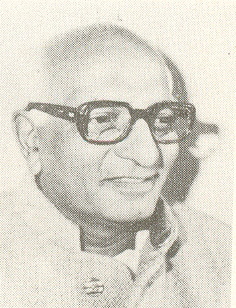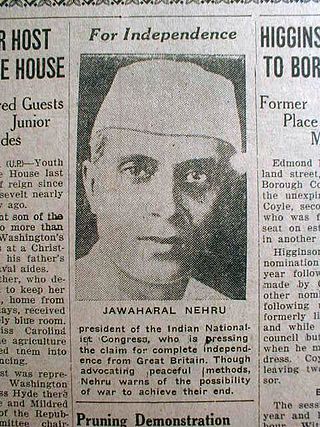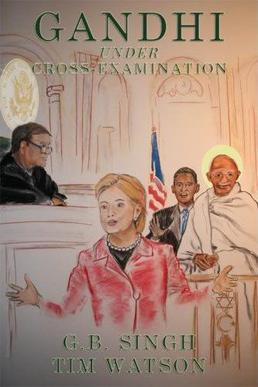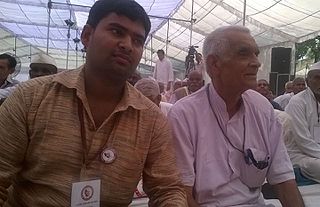
Mohandas Karamchand Gandhi was an Indian lawyer, anti-colonial nationalist and political ethicist who employed nonviolent resistance to lead the successful campaign for India's independence from British rule. He inspired movements for civil rights and freedom across the world. The honorific Mahātmā, first applied to him in South Africa in 1914, is now used throughout the world.

The Story of My Experiments with Truth is the autobiography of Mahatma Gandhi, covering his life from early childhood through to 1921. It was written in weekly installments and published in his journal Navjivan from 1925 to 1929. Its English translation also appeared in installments in his other journal Young India. It was initiated at the insistence of Swami Anand and other close co-workers of Gandhi, who encouraged him to explain the background of his public campaigns. In 1998, the book was designated as one of the "100 Best Spiritual Books of the 20th Century" by a committee of global spiritual and religious authorities.
Swarāj (Svarāja) sva "self", raj "rule") can mean generally self-governance or "self-rule". It was first used by Chhatrapati Shivaji Maharaj to attain self rule from the Mughal Empire and the Adilshahi Sultanate. Later, the term was used synonymously with "home-rule" by Maharishi Dayanand Saraswati and later on by Mahatma Gandhi, but the word usually refers to Gandhi's concept of Indian independence from foreign domination. Swaraj lays stress on governance, not by a hierarchical government, but by self-governance through individuals and community building. The focus is on political decentralisation. Since this is against the political and social systems followed by Britain, Gandhi's concept of Swaraj advocated India's discarding British political, economic, bureaucratic, legal, military, and educational institutions. S. Satyamurti, Chittaranjan Das and Motilal Nehru were among a contrasting group of Swarajists who laid the foundation for parliamentary democracy in India.

Gandhism is a body of ideas that describes the inspiration, vision, and the life work of Mohandas K. Gandhi. It is particularly associated with his contributions to the idea of nonviolent resistance, sometimes also called civil resistance.
"A Letter to a Hindu" was a letter written by Leo Tolstoy to Tarak Nath Das on 14 December 1908. The letter was written in response to two letters sent by Das, seeking support from the Russian author and thinker for India's independence from colonial rule. The letter was published in the Indian newspaper Free Hindustan. The letter caused the young Mohandas Karamchand Gandhi to write to Tolstoy to ask for advice and for permission to reprint the Letter in Gandhi's own South African newspaper, Indian Opinion, in 1909. Gandhi was living in South Africa at the time and just beginning his activist career. He then translated the letter himself, from the original English copy sent to India, into his native Gujarati.

Madhu Dandavate was an Indian physicist and socialist politician, who served as Minister of Railways in the Morarji Desai ministry, and as Minister of Finance in the V P Singh ministry.

The Declaration of Purna Swaraj was a resolution which was passed in 1930 because of the dissatisfaction among the Indian masses regarding the British offer of Dominion status to India. The word Purna Swaraj was derived from Sanskrit पूर्ण (Pūrṇa) 'Complete', and स्वराज (Svarāja) 'Self-rule or Sovereignty', or Declaration of the Independence of India, it was promulgated by the Indian National Congress, resolving the Congress and Indian nationalists to fight for Purna Swaraj, or complete self-rule/total independence from the British rule.
"Raghupati Raghava Raja Ram" is a bhajan widely popularised by Mahatma Gandhi and set to tune by Vishnu Digambar Paluskar in Raga Mishra Gara.
Geoffrey Nielsen Ostergaard was a British political scientist best known for his work on the connections between Gandhism and anarchism, on the British co-operative movement, and on syndicalism and workers' control. His books included The Gentle Anarchists: A Study of the Sarvodaya Movement for Non-Violent Revolution in India (1971), coauthored with Melville Currell, and Nonviolent Revolution in India (1985), both dealing with the Sarvodaya movement. He spent the majority of his academic career at the University of Birmingham.

Madhukar Dattatraya Deoras, was the third Sarsanghchalak of the Rashtriya Swayamsevak Sangh (RSS).

Gandhi Under Cross Examination is a 2009 book written by G. B. Singh and Dr. Tim Watson evaluating the iconization of Mohandas Karamchand Gandhi as a civil rights protagonist.

Ramjee Singh is a former Member of Parliament and vice-chancellor of Jain Vishva Bharati University. He is an eminent Gandhian and is the author of a number of books on him. He was also the director of Gandhian Institute of Studies, Varanasi, India. In January 2020 he was awarded the fourth highest civilian award in the country: The Padma Shri for Social Work. His life has been a blend of being a Gandhian academician as well as an activist. Singh has declared Mahatma Gandhi as the Bodhisattva of the 20th century.
Manfred B. Steger is an American academic and author. He is a Professor of Sociology at the University of Hawaiʻi at Mānoa.
G. B. Singh is the author of Gandhi Behind the Mask of Divinity, a biography of Mahatma Gandhi and Gandhi Under Cross Examination.
Hindu nationalism has been collectively referred to as the expression of social and political thought, based on the native spiritual and cultural traditions of the Indian subcontinent. "Hindu nationalism" is a simplistic translation of हिन्दू राष्ट्रवाद. It is better described as "Hindu polity".

Anthony Parel is a Canadian historian, author and academic. He has authored and edited a number of books, on subjects including Thomas Aquinas, Niccolò Machiavelli, Mohandas Karamchand Gandhi and South Asian history.
Jainism and Hinduism are two ancient Indian religions. There are some similarities and differences between the two religions. Temples, gods, rituals, fasts and other religious components of Jainism are different from those of Hinduism.

Nancy K. MacLean is an American historian. She is the William H. Chafe Professor of History and Public Policy at Duke University. MacLean's research focuses on race, gender, labor history and social movements in 20th-century U.S. history, with particular attention to the U.S. South.

Historiography is the study of the methods of historians in developing history as an academic discipline, and by extension is any body of historical work on a particular subject. The historiography of a specific topic covers how historians have studied that topic using particular sources, techniques, and theoretical approaches. Historiography is defined as "the study of the way history has been and is written – the history of historical writing", which means that, "When you study 'historiography' you do not study the events of the past directly, but the changing interpretations of those events in the works of individual historians."

Gandhi and Philosophy: On Theological Anti-politics is a book written by philosophers Shaj Mohan and Divya Dwivedi. It was published by Bloomsbury Academic, UK. The book is based on analysis of Mahatma Gandhi's philosophy and has received a positive reception.











